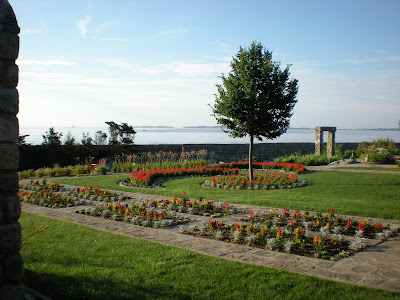Here are some photos from the summer residency, plus the lyrics to the "FU-MFA" song, &
a slightly revised version of "The Arm of St. Edmund"...

Frankie in the li'l prayer chair
FU-MFA! (x3)
Here we are again at Ender's Island
Look around you'll see that everyone is smiling.
Hi, where ya from and what is your genre?
Can you tell me now where can I do my laundry?
FU-MFA! (x3)
7 months ago the gales were blowing
The sky was gray and it was snowing.
We read and wrote and then we went and had breakfast
We read and wrote and then we went and had lunch
We read and wrote and then we went and had dinner
We read and wrote and then we drank a lot of wiiiiiine.
FU-MFA! (x3)
So our advice to you new MFA'ers
Start writing and start saying your prayers.
Make sure that you pick a good mentor
and not one who will be a tormentor.
FU-MFA! (x6)
***
The Arm of St. Edmund
By Chris Belden
The arm of St. Edmund of Canterbury went missing from the chapel sometime between the reading Wednesday night and 9 a.m. mass on Thursday. The glass tube in which it had long rested sat empty but for the small golden pillow on which the saint’s petrified hand had once lain. Word spread quickly among the writers gathered on the island. Several recalled a moment on Wednesday night, around 11:30, when tapping was heard on the window of the St. Michael’s community room, where they’d been drinking beer and gossiping. They had laughed at the time, but now, as they remembered the rap rap rap on the glass, each one of them pictured the blackened fingers of St. Edmund. The stories accumulated throughout the day. A poet’s door had mysteriously opened while she lay in bed reading. “There was a click,” she reported, “and I watched the knob turn, but no one was there.” Items went missing: a fountain pen, a cell phone, a collection of spiritual poems. One fiction writer was certain a beer had been stolen from his private cooler under his desk. Meanwhile, the authorities had been summoned and were conducting a search of the island. The slightly offended writers opened their rooms to police officers, who peered under beds and into closets. By late afternoon, the arm had not been found. It was suspected that outsiders had been responsible, and the police moved their investigation off-island. That evening, as one of the fiction writers neared his room, he heard someone strumming his guitar. “I figured it was my roommate,” he said later, but when he opened the door, the room was empty and the guitar lay on the bed where he’d left it. “What song was it playing?” someone asked, and the writer, a novelist, said, “It sounded like ‘Freebird.’” Later that night, a half-asleep non-fiction writer was certain she heard someone typing on a laptop. Assuming it was her roommate, she went back to sleep, but in the morning she discovered that all the adverbs had been deleted from the opening chapters of her memoir. At breakfast the next morning everyone seemed to have a story. Someone’s light had turned on at 4 a.m. Another had woken to find her suitcase open, her underwear in disarray. The director of the writing program had discovered that the cap to his expensive single malt scotch had gone missing, though he couldn’t say for sure he hadn’t lost it himself the night before. On this, the final day of their residency on the island, the writers could talk of little else but St. Edmund’s arm and the weird events that had occurred. The arm appeared in workshop exercises, crept into poems. One writer, previously disdainful of genre fiction, began writing a mystery thriller about the theft of a relic arm on whose hand was tattooed, in Aramaic, the secret location of the Virgin Mary’s bones. That night, no one slept. And while a few fiction writers did get drunk, the others were attached to their notebooks and computers, composing epic poems, experimental novels, and memoirs exploring religious themes. By morning everyone was exhausted and elated, and ready to return home and continue their projects. They buzzed like a hive of bees at breakfast: “I wrote ten solid pages!” “I wrote five sestinas and three sonnets!” “I started a memoir about my twelve years of Catholic school education—and I wasn’t even molested!” Afterward, everyone packed up and said farewell. There were hugs and kisses and cries of “Good luck!” and “Keep writing!” Cars were loaded with suitcases and books and computers. And if anyone had looked back as they drove, one by one, across the narrow causeway away from the island and toward their homes and jobs and families, they might have caught a glimpse of someone waving goodbye, his shriveled black fingers glinting in the morning sun.



